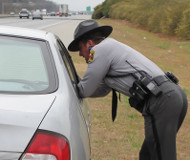9/13/2017
States Resist Speed Trap TransparencyState offices receiving federal speed trap funds urge administration to drop legal requirement to survey speed camera usage nationwide.

States are more than happy to receive their annual share of $450 million in federal cash used to run speed traps and roadblocks, but they are now actively resisting efforts to increase the transparency and accountability of the programs being funded. Congressional lawmakers attached a provision requiring states to clarify how automated ticketing machines are used within the 558-page law that provides transportation grants (view law). The surveys are to be conducted at federal expense.
"A state shall expend funds apportioned to that state under this section to conduct a biennial survey that the secretary [of Transportation] shall make publicly available through the Internet website of the Department of Transportation that includes a list of automated traffic enforcement systems in the state; adequate data to measure the transparency, accountability, and safety attributes of each automated traffic enforcement system; and a comparison of each automated traffic enforcement system with [the US Department of Transportation's] Speed Enforcement Camera Systems Operational Guidelines and Red Light Camera Systems Operational Guidelines," the 2015 law requires.
It is the National Highway Traffic Safety Administration's job to implement the congressional mandate, so the agency published an interim final rule ordering each state either to certify that no automated ticketing machines are in use on any public road, or submit results of a detailed survey no later than March 1. The agency did not elaborate on the requirements laid out in the congressional text, infuriating several states that, for the most part, repeated the response provided by the Governors Highway Safety Association (GHSA), an organization that lobbies on behalf of the state offices that receive speeding ticket grant money.
"The prohibition against the use of federal funds for automated enforcement has existed for many years and states have not been using federal funds for this purpose," the organization complained in a letter to NHTSA. "To require states to then use federal funds to assess these systems will likely require costly contracts with outside research consultants."
The National Motorists Association (NMA), a driver advocacy organization, called on the federal agency to uphold the congressional intent.
"The states arguing against transparency and accountability for their ticket camera programs is rich -- literally," NMA president Gary Biller told TheNewspaper. "Federal funding for enforcement actions is an entitlement, not an absolute right held by the states. The preconditions established by NHTSA are entirely appropriate in protecting motorists from abuse."
The state of Maryland separately petitioned NHTSA to go easy with the transparency requirements, complaining that the cost of surveying so many local jurisdictions that use cameras would cut into the budget for ticketing operations and roadblocks. The Maryland governor's highway safety representative, Christine Nizer, petitioned NHTSA to allow the use of a "precursory survey form" consisting of eleven simple "yes" or "no" checkboxes in lieu of providing specific evidence demonstrating one way or another the impact cameras had on safety.
"Does the automated enforcement program utilize specific safety criteria for the placement of enforcement platforms, yes or no?" Nizer wrote as an example.
NHTSA has yet to finalize the requirements for the national speed camera survey.


